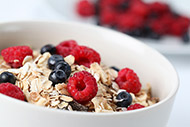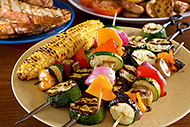
The role of antioxidants.
Free radicals are molecules in the body that damage cells and may increase your risk for disease. They result from converting food to energy, performing exhausting exercise, and exposure to environmental elements, like smoke and pollution. Antioxidants are important because they bind to these free radicals, preventing their ability to damage cells and potentially improving health.
Types of antioxidants.
Four major vitamins and minerals are classified as antioxidants, including vitamin C, vitamin E, selenium, and beta-carotene (converted to vitamin A in the body). In addition to these main nutrients, many phytonutrients (plant nutrients) act as antioxidants. Some examples of phytonutrient categories include flavonoids and polyphenols. There are numerous phytonutrients within all these categories. There are more than 600 known carotenoids alone. Each food source for antioxidants has a unique set of these phytonutrients, and scientists regularly discover new compounds and health benefits.
Top food sources for antioxidants.
Getting antioxidants from food is preferred over loading up on supplements. Research on the effectiveness of these supplements is mixed, and it is possible to get too much of these vitamins and minerals, which can lead to toxicity. By eating a variety of foods, you can ensure a healthy balance of antioxidants. Fruits and vegetables are the best sources, along with nuts, legumes, and whole grains. The United States Department of Agriculture has researched the antioxidant capacity of over 100 foods. Results for the top fruits include prunes, raisins, blueberries, blackberries, strawberries, raspberries, plums, oranges, red grapes, and cherries. The top vegetables include kale, spinach, Brussels sprouts, alfalfa sprouts, broccoli florets, beets, red bell peppers, onions, corn, and eggplant.
Sources



 3 Healthy Lunches for Your Work Week
3 Healthy Lunches for Your Work Week
 5 Tips for Stretching Your Budget for Healthy Food
5 Tips for Stretching Your Budget for Healthy Food
 Best Ways to Reduce Added Sugar
Best Ways to Reduce Added Sugar
 Healthy Tips to Lighten Up Picnic Foods
Healthy Tips to Lighten Up Picnic Foods
 Do You Need to Drink Milk?
Do You Need to Drink Milk?
 Tips to Keep Track of Water Intake
Tips to Keep Track of Water Intake
 Butter vs. Margarine: What’s the Best Choice?
Butter vs. Margarine: What’s the Best Choice?
 7 Good Mood Foods
7 Good Mood Foods

 Pinterest
Pinterest RSS Feed
RSS Feed